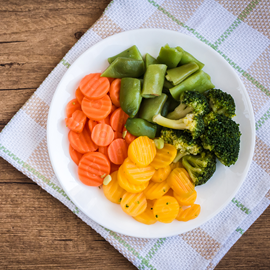25
Jul
Why Veggies Matter after Weight Loss Surgery
 We live in an era where “new and improved” beats out “traditional” or “standard” on every single front. Unfortunately, this way of thinking has largely penetrated our ways of thinking about diet and weight loss, too. Every couple of weeks there is talk about an all-new diet program that one celebrity or another is promoting, and you don’t need to go searching far in the grocery store to find advertisements about a new formula or improved recipe that is supposed to help you lose weight.
We live in an era where “new and improved” beats out “traditional” or “standard” on every single front. Unfortunately, this way of thinking has largely penetrated our ways of thinking about diet and weight loss, too. Every couple of weeks there is talk about an all-new diet program that one celebrity or another is promoting, and you don’t need to go searching far in the grocery store to find advertisements about a new formula or improved recipe that is supposed to help you lose weight.
Once you’ve been around the block a few times, it becomes harder to believe all of the hype that is posted on those food packages or magazine covers. If you want to lose weight, you need to focus on following a healthy diet that is rich in lean protein and lots of fresh vegetables. Regular exercise will help, too. This is the fundamental formula for successful weight loss. It is tried and true, and a concept that you are likely already familiar with. Even after having weight loss surgery, this is the formula that is going to help you lose weight.
Vegetables are a key aspect of a successful weight loss diet for a few reasons:
- Vegetables are low in calorie content
- They are nutrient dense
- They are typically rich in fiber, which supports healthy digestion
What’s more, vegetables are actually really great for your health. Eating a diet that is rich in vegetables supports heart health, promotes optimal brain function, and even encourages a happier mood. Recently, researchers also found that eating a vegetable-rich diet can reduce your risk of developing early menopause, which can mean major improvements to your quality of life.
After having weight loss surgery, your weight loss surgeon will encourage you to eat more vegetables as a way to maximize nutrient intake in a low-calorie diet. Raw vegetables are both difficult to digest after weight loss surgery, and aren’t as tasty as well-prepared veggies.
Here are a few tips to help you enjoy your veggies even more:
- Try steaming your vegetables to make them easier to eat. A quick and easy way to steam vegetables is with a steamer tray in your microwave.
- Use spices like salt and pepper to give your vegetables a bit of extra flavor without extra calories. Garlic, paprika, rosemary and cumin can all help your veggies have a flavorful pop with every bite.
- Try mixing your veggies together to combine textures and flavor profiles. Roasted sweet potatoes with squash and zucchini is one example of how you can turn a healthy side dish into something scrumptious.
Vegetables should be a core part of your diet following weight loss surgery. Talk to your weight loss surgeon about recommendations for how you can add more vegetables into your weight loss diet.




Why Veggies Matter after Weight Loss Surgery